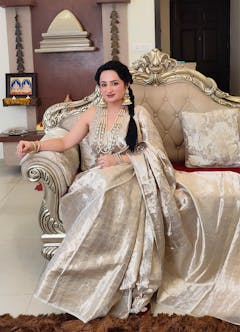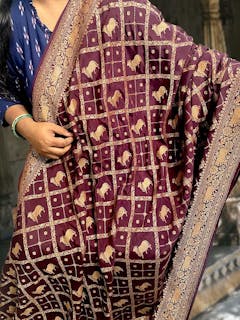Banarasi Silk Fabrics
Recently viewed
Understanding the Journey of the Banarsi Silk Fabric
Every woman has Banarsi silk sarees, Banarsi silk salwar suits, or lehengas in her wardrobe. Have you ever wondered why is the craze for Banarsi silk fabric undeterred regardless of the various fashion trends?
This luxurious, shining fabric is a true masterpiece that has won the hearts of many all around the world for several years now. Right from the ancient Banarsi silk sarees to the new age lehengas and Banarsi silk salwar suits, the Banarsi silk fabric has not lost its charm.
In this article, we will understand how this beautiful fabric originated and evolved.
Origin of the Banarasi Silk
The Banarsi silk fabric was created in the city of Varanasi or Banaras. It is one of the famous fabrics that was weaved for the first time in the Mughal era. Mughal emperor Akbar was the person who pioneered the Banarasi weaving technique. The Mughals encouraged and promoted the Banarsi silk weaving techniques and designs.
Known for its exquisite quality and intricate geometric and floral designs, the Banarsi silk fabric often has gold or silver thread or zari work.
How did the Banarasi Silk Fabric Evolve?
The weaving technique of the Banarsi silk fabric is quite fascinating. Silk fabrics are woven on a jacquard loom which has around 5600 threads with a width of 45 inches. A thread or a weft goes over and under a set of threads called the warp. The way in which the weft passes over and under the warp determines the pattern that is woven into the silk fabric.
A weaver will create design boards by outlining on graph paper by indicating the colour concepts. The punch cards come in front before the final design is chosen, and then hundreds of such cards are formed to create a single pattern on the fabric.
When the British took over India, Banaras turned into the central hub for producing this fabric. The production of Banarsi silk fabrics was encouraged by them and consequently, the demand for this silk fabric saw an upward trend in countries like Europe and America.
While the demand for this fabric surged each year, it also has undergone several changes. However, this silk fabric stays as one of the most popular types of silk fabrics in India. The Banarsi silk fabric is used widely in India to make traditional garments.
With time, the designs have become intricate and new methods of production and weaving have developed. Today, Banarsi silk fabric is one of the most preferred types of fabric across the globe.
Buy Banarsi Silk Sarees and Lehengas from Chinaya Banaras
Chinaya Banaras has a wide range of Banarsi silk sarees, lehengas, and Banarsi silk salwar suits to cater to women of all age groups. Chinaya Banras offers exquisite and the finest designs that will certainly win your heart. Besides, Chinaya Banaras is known for its uncompromised quality of Banarsi silk fabrics.



























































































